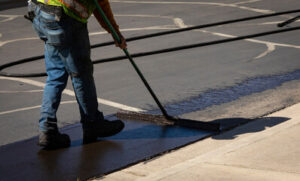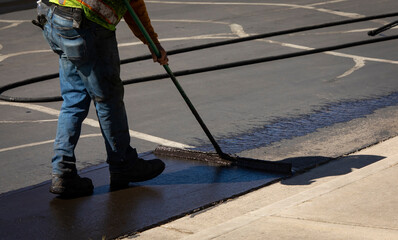Rochester NY Sealcoating is a process that makes asphalt look like new and protects it from the elements. This helps extend the life of the pavement and saves money by preventing the need for a complete replacement.
The first step is a thorough inspection of the asphalt surface to identify cracks, deterioration, and other problems. Then the surface is cleaned with outdoor power equipment.
Water damage is one of the biggest problems associated with asphalt pavements. Left unattended, it will eat away at the surface, cause cracks, and eventually deteriorate the base course. This type of damage is expensive to repair and can even require a complete pavement replacement. Sealcoating helps to prevent this by keeping water from penetrating the paved surface. It also protects the paved surface from oil and chemical spills as well as the UV rays that can cause sun damage to asphalt surfaces.
The best time to apply a seal coat is in the spring or fall, when temperatures are above 50 degrees. It is also important to avoid applying the sealcoat when there is a chance of rain within 24 hours. If the sealcoat is exposed to moisture before it can properly cure, the resulting oxidation will create flaking and pitting of the surface.
While many property owners think that paving is a low-maintenance surface, it actually requires regular care to keep it looking attractive and functioning at its best. Rather than wait for the pavement to deteriorate, and then shell out money on repairs, it is much more cost-effective to take a proactive approach. Regular sealcoating will extend the lifespan of the paved surface, saving money in the long run.
Everyday vehicles drip gas, oil and other automotive fluids on to the paved surface. If this is not prevented, it will eat away at the asphalt, causing premature deterioration and costly maintenance. Preventative sealcoating stops these harmful fluids from leaking down below the surface, and it keeps them from deteriorating the asphalt from the inside out.
Moisture seepage into the paved surface is not only detrimental to the look and condition of the asphalt, but it can also lead to potholes and alligator cracking. If these problems are allowed to escalate, the cost of a resurfacing project will increase exponentially. By investing in a preventative sealcoat every two years, you will save yourself from major expenses in the future. This is a wise investment in the longevity of your parking lot or driveway that will pay for itself in the form of reduced repair costs down the road.
Prevents Oil and Fuel Spills
Asphalt is petroleum-based, and when oil or other automotive fluids spill onto a parking lot it can eat through the surface and soften it. Seal coating prevents this damage by creating a barrier between the spilled substance and the asphalt. This prevents gasoline, oils and other chemical substances from binding with the pavement, causing it to degrade over time. This saves the owner of the property money in maintenance costs and repairs.
Keeping up with your sealcoating schedule can also help to maintain the rich slate black color of the pavement. This enhances the curb appeal of a business, apartment building, condominium complex or homeowners association parking lot and gives potential customers, clients and residents a great first impression. It’s important to note that in addition to sealcoating, regular pavement striping is necessary to keep your parking lot looking its best.
If you notice oil spots on your pavement it is critical to act quickly. These spots start out as just a stain, and if they are not removed in a timely manner can degrade the asphalt pavement beneath them. Sealcoating is the best way to protect your investment and extend the life of your parking lot.
In addition to protecting against petroleum spillage, asphalt sealcoating will also help to prevent the penetration of water and other chemical substances into your pavement. This is an especially important benefit for military installations where fuel leakage from aircraft can cause significant damage to the airfield. Sealcoating will also create a protective layer that shields the pavement from the harmful effects of sabotage where the fuel may be dumped deliberately on an airfield to interfere with airplane operations.
It is important to understand that not all sealcoating contractors are created equal. Many of them are more interested in a quick sale and profit than providing quality service. We recommend that you take a close look at the company you hire and always go by the manufacturers recommendations when spraying pavement sealer. Many of the less experienced or unscrupulous seal coating contractors will claim that they can apply 2 coats versus the recommended 1 coat. This is because they do not use the proper equipment for application, do not mix the product properly and often leave a film on the pavement instead of creating a smooth even coating.
Prevents UV Damage
Asphalt is a petroleum-based product, and without proper protection it will break down due to exposure to the elements. Seal coating creates a protective barrier against water damage, chemicals, oil spills and more, extending the life of your asphalt surface.
The sun’s UV rays can wreak havoc on asphalt surfaces by causing the oxidation process to speed up. This dries out the bitumen in your asphalt, leaving it brittle and prone to cracking. Sealcoating prevents this by acting as the asphalt version of sunscreen, keeping UV rays from aging your pavement.
As a result, your asphalt will last longer and stay in better condition, saving you money on repairs and replacements. Sealcoating also acts as a waterproof barrier to prevent water from seeping into the cracks of your parking lot and further deteriorating the asphalt underneath.
Cracks in your asphalt allow water to enter the base of the pavement and erode the material, which can then lead to potholes and structural failure over time. Sealcoating fills in these cracks and prevents water from penetrating the base of your asphalt, reducing your risk of costly repair bills.
Refined coal tar is the most popular binder used in sealcoating, as it has superior resistance to destructive elements such as sunlight, weather conditions and petrochemicals. Asphalt emulsion (AE) sealcoating is less effective, as it doesn’t provide the same level of resistance against these substances.
If you want your asphalt to stand the test of time, invest in a high-quality asphalt sealcoat from ACPLM. Our expertly-trained professionals can ensure your asphalt is protected, so you can save money and extend the lifespan of your driveway or parking lot. Call us today to learn more about our services and schedule your free consultation! We proudly serve commercial and residential clients in Las Vegas, NV and the surrounding area. The sooner you call, the faster we can get started on your project! We look forward to working with you.
Prevents Stains
Asphalt pavement is vulnerable to a number of environmental factors, including sunlight and water. When it comes to water, it can seep into cracks and holes in a slab of asphalt and cause erosion. Seal coating creates a barrier to stop this from happening and keeps your pavement strong and healthy.
Asphalt is also prone to stains from oil and fuel. These stains are easy to clean, but can be hard to remove completely. When you get a new seal coat, workers can use flash heating to burn off the petroleum before applying the new material. This leaves a much cleaner, purer surface.
Stains are not only a problem for the pavement, but they can be dangerous for pedestrians and drivers. They can make it more difficult to see the edge of a parking lot or driveway and may result in someone slipping and falling. Sealcoating contains additives that prevent slippage. This is a great way to protect people and reduce liability for your business.
Seal coating is a process that can be messy, and it requires specific weather conditions to work well. It must be dry before the work can begin, and there should not be more than 40% chance of rain within 24 hours after the seal coat has been applied. If these conditions are not met, the seal coat will deteriorate and fail to provide the protection it is designed to offer.
During the application process, employees need to wear the right PPE (personal protective equipment). Coal tar sealants contain cancer-causing chemicals and have been shown to contaminate streams and creek beds with polycyclic aromatic hydrocarbons. Other seal coating materials are safer, but still release harmful fumes during the process and can irritate a worker’s eyes and nose. In these cases, it is important to offer employees a full selection of disposable coveralls to keep them safe and comfortable during the job. International Enviroguard offers a wide selection of high quality, disposable sealcoating coveralls to help your workers stay protected on the job.
